Wine Tourism and Women’s Role in the Italian Wine Industry
Donatella Cinelli Colombini is a pioneer in the world of wine and wine tourism movement. Her daughter, Violante Gardini is masterfully following in the footsteps of her mother. These two strong women are making the Italian wine world grow.
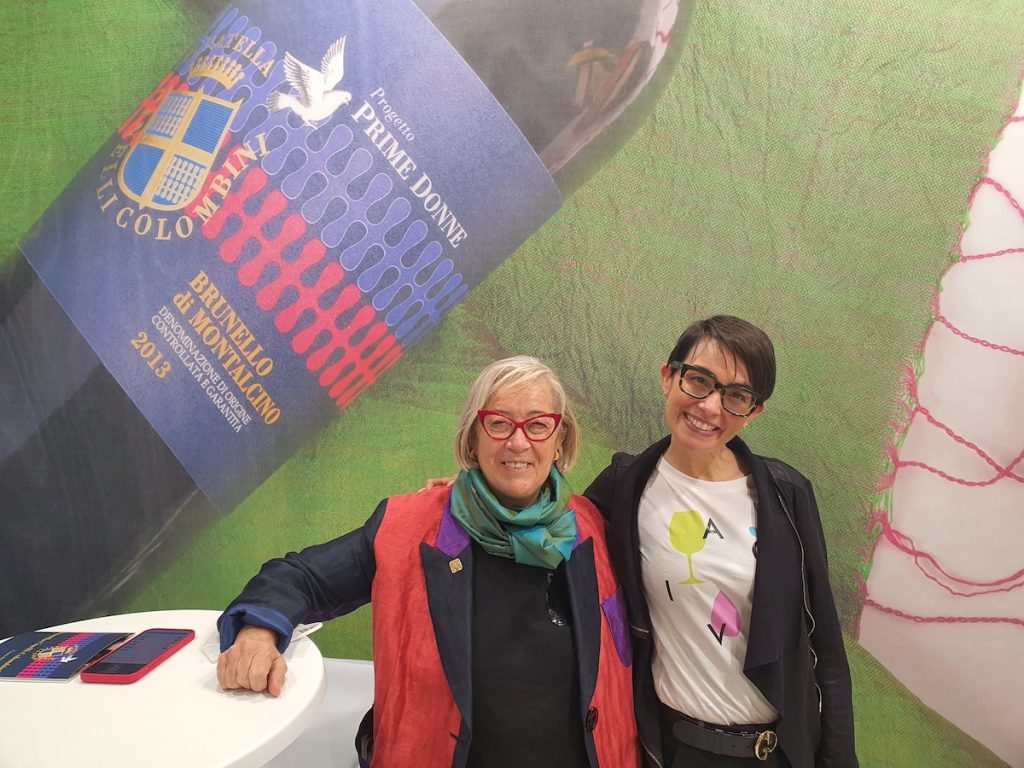
Who is Donatella Cinelli Colombini?
Born in Tuscany to a family of Brunello di Montalcino producers, she studied Medieval Art History at the university. She worked in the family business for many years and then founded her own company Casato Prime Donne. It is dedicated to Brunello di Montalcino and only women work there.
Donatella Cinelli Colombini, characterized by her visionary and modern approach, is one of the founders of The Wine Tourism Movement: an association that aims to develop wine tourism in Italy. “Cantine Aperte”, one of the most successful events of the Movement. In 1993, it marked a great turning point when the cellars finally opened to the public.
Today, Donatella Cinelli Colombini is also the president of the Donne del Vino (aka Women of Wine Association) of which I am also a proud member. The non-profit association promotes the culture of wine and the role of women in the world of wine and in general in society.
Interview With Donatella Cinelli Colombini
You are a visionary and a pioneer in the world of wine: just think of the Wine Tourism Movement, the Women of Wine, and your companies. But how does Donatella Cinelli Colombini define herself?
First of all, I’m a producer. I believe that each of us has talents within us. Some believe it, others are afraid to get involved. In reality, I see opportunities, paths that others do not see, I do not invent anything. Maybe I can give courage, conviction, team spirit to those who work with me. As the great sport coaches say, in order to win, the team that enters the match field must be convinced that they can do it and that they want to do it.
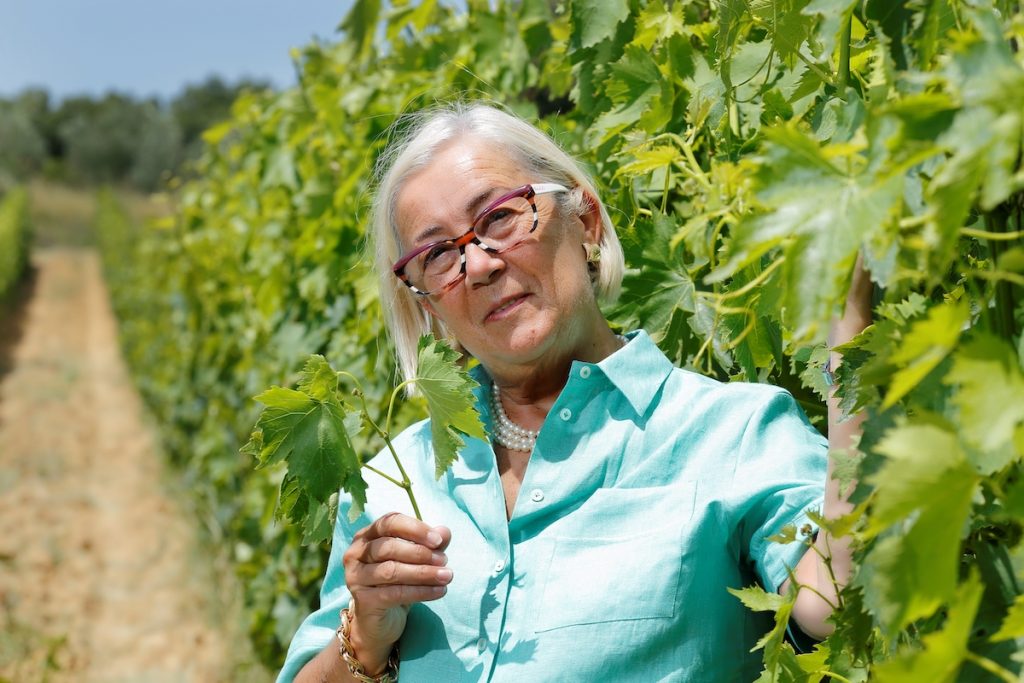
You are President of the Women of Wine Association. The association was born in 1988 and now we are in 2022. Does it still make sense to talk about ‘gender distinction’?
Women in Italy manage about a third of Italian wineries. These wineries are small compared to the average. The arable agricultural area of the companies led by women is 21% of the total. This 21% produces 28% of agricultural GDP. This data already tells us that women are performing.
Women are the minority in the vineyard cellar. Most women work in marketing, sales, communication, and wine hospitality. In Italy, the female presence in the wine hospitality sector looks like this:
- a third of Italian wineries have only women to welcome tourists.
- 1/3 is predominantly women.
- Italian wineries with only men in wine hospitality is only 6%: almost nothing.
In the hands of women.
This tells us that the best performing sectors, where wine is transformed into real money, are in the hands of women.
At an international level, this fact has changed the percentages of the gender gap. For example, in the USA, for every 100 dollars earned by a man, a woman earns $90. In the wine sector, women earn $96. Therefore, they are very close to that of men.
Women preside over the new sectors of wine. Numerically in the total number of employees they are. Perhaps it’s not yet relevant, but they are in the centers where wine becomes business.
On the one hand, we must try to accelerate the process towards gender equality in terms of career and pay. On the other hand, abuses must be counteracted. We must fight the offense which is 6%. But this number tells us that under the tip there is an iceberg made up of dissuasive, devalorized attitudes, and a whole series of processes that lead women to have no space. It must be understood that women can offer a lot to Italian wine.
To date, the gender gap costs Italy about 90 billion.
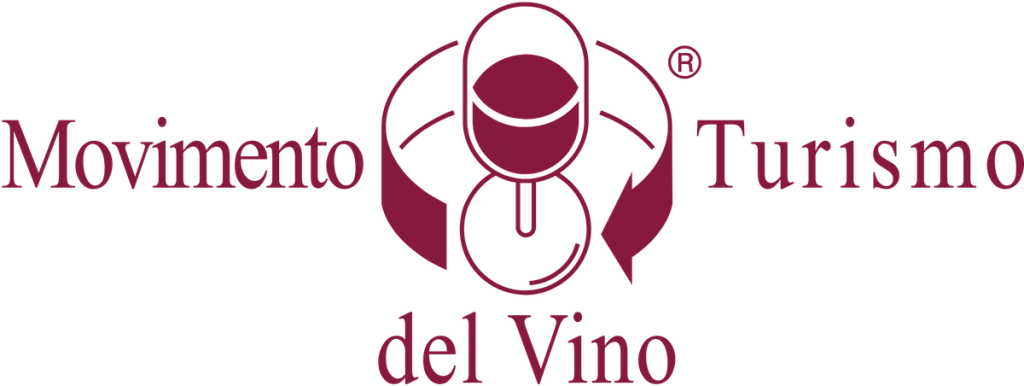
What future would you like for Italian wineries run by women?
I would like to see the average price (especially for export) become the same as the French one.
Men reason by objectives and women by relationships. The man makes the sale, and the woman creates a market. Women can make the difference in the future.
We often speak of “wine for women”– perhaps ready to drink and, not too complex. But does it still make sense to speak of “wine for women or men”?
Absolutely not. In Italy when referring to the continuous consumption of wine, women have surpassed men. They are 55%. It’s not just wine as an aperitif or on the weekend. Yet women are 55% of total consumers.
The percentage of those who buy wine gravitates more strongly towards women. Generally, the woman does not buy for herself. She has a more pragmatic reasoning. She buys based on her needs: for family (her aim is to optimize the quality / price ratio), as a gift (what the person will like), etc.
The woman buys wine as she buys a pullover for the office or a silk sheath dress for the theater.
Today we see that in countries where they have already adapted to the prevalence of female buyers, sales shelves have also changed. The woman changes her purchases based on how she will use that bottle of wine: for an appetizer, for fish, light soups, for special occasions, etc. The woman is pragmatic.
What is the biggest lesson you have drawn from the world of wine?
It is a beautiful world because it brings nature into contact with people from all over the world with the same passion.
Her identikit of women in wine
She must be a professionally valid, generous, courageous person, and capable of drawing others along.
Interview With Violante Gardini Cinelli Colombini
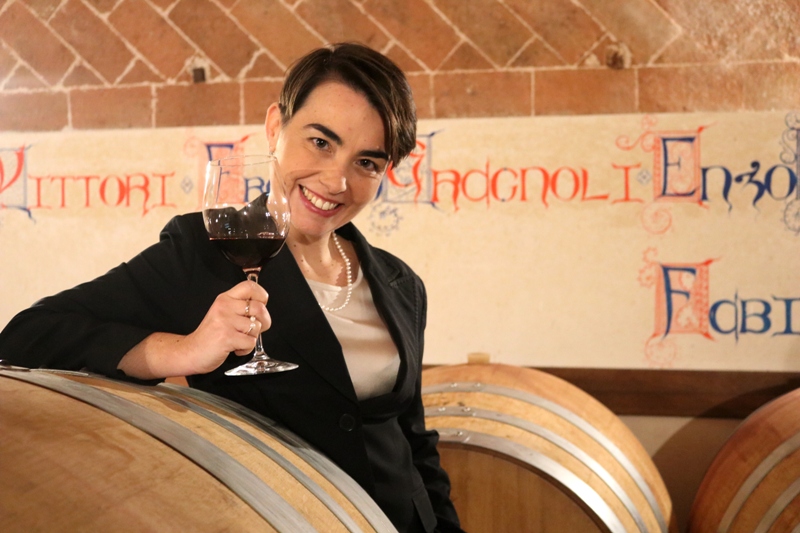
Violante, you are the president of AGIVI (Association of Young Italian Wine Entrepreneurs) and must deal with the new generation of wine industry professionals in Italy. I want to start with a personal question. Having been born in the world of wine and with a mother who has inspired you, tell us what is wine for you? Work, duty, or passion?
I can’t tell it apart from my daily life. I want to clarify that I am a very lucky person. I have never been forced to do this job: I played with barbies among the wine boxes listening to my mother while she was conducting cellar tours. Wine has always been a daily thing for me.
I liked to draw. I also made houses for my barbies. At a certain point I chose a scientific high school, then economics at the university. I had the opportunity for a wonderful master of the OIV (International Organization of Vine and Wine) which allowed me to travel for 11 months around the world with 18 people of all nationalities. I was the only Italian. And from there my wine journey began. By going to visit wineries I adapted my palate and opened my eyes.
When I came back home, the company needed me. I am an only child, so mom gave me the choice: either you work here with us, or you need to find a workplace elsewhere.
Starting from the bottom.
I started from the bottom, making visits to the cellar, direct sales in the shop of the cellar, and slowly I arrived at the sales department. This led me to travel and meet people, but always with the mentality of saying that I can’t be alone in what I do. Interaction with people is essential. With this principle I joined AGIVI Association: first as a partner, then in the Council and then as the president.
The passion of wine and work are one and the same.
The role of women in the new generation of wine entrepreneurs. What can you tell me about that?
I see that the new generations who join the company are now smarter than in the past.
When I wasn’t working in the company, I saw things from outside and I didn’t analyze them deeply.
I didn’t like this ‘pink quota’ rule. If a man or woman is intelligent, why should they have this gender distinction? My mom made me understand that if we didn’t feel an obligation to put women in certain chairs, maybe there wouldn’t be one. And this is the situation in some wine consortia for example.
However, there are objective difficulties for young people. But it is also true that at some point, if you are confident, especially in the commercial sector, you can go beyond the gender distinction.
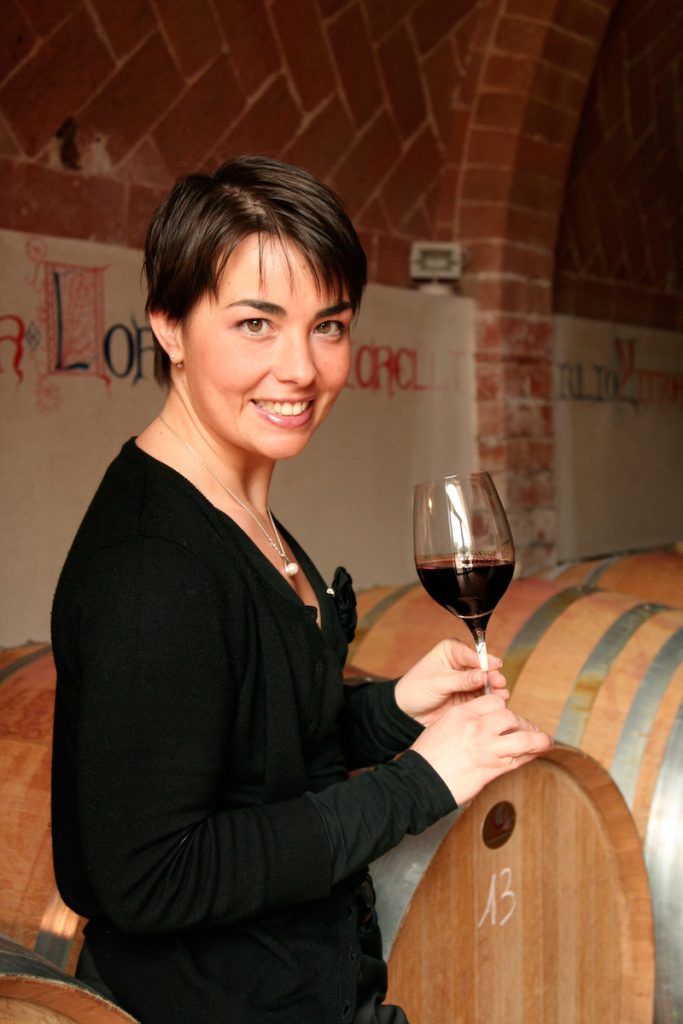
In AGIVI, what will you focus on? What are the plans for these new entrepreneurs?
There is a very strong desire to be together, talk, network, and advise each other.
The basics of AGIVI are:
- Network
- Training
- Wine trips
We have opportunities for young people to go to Brussels for example. They have a chance to understand what is happening at a European and global level in the wine industry. There are therefore many possibilities to learn and emerge.
In the world of wine, we often talk about the binomial “tradition / innovation. Is it really possible? And in what way? What do these two words mean to you?
Young people are very open-minded from the point of view of communication. They are more confident in talking about wine, both from an organoleptic and storytelling point of view.
Sustainability is also fundamental for them. Young people face it in the vineyard, but also in all areas involved in wine and wineries: transport, suppliers, glass, labels, etc.
A positive aspect of this pandemic was that young people were able to enter the family business to manage the digital communication during the lockdown. And in that moment, the older generations listened to them.
What is the biggest lesson you have drawn from the experience of the Association AGIVI?
The biggest lesson is that difficulties can become opportunities.
I have seen it in the family business.
The association has given me so much. The association has really enriched me a lot. It was a long journey and I tried to learn as much as possible.
Another lesson I learned is that everyone has their chance, and no one is in Series A or Series B.
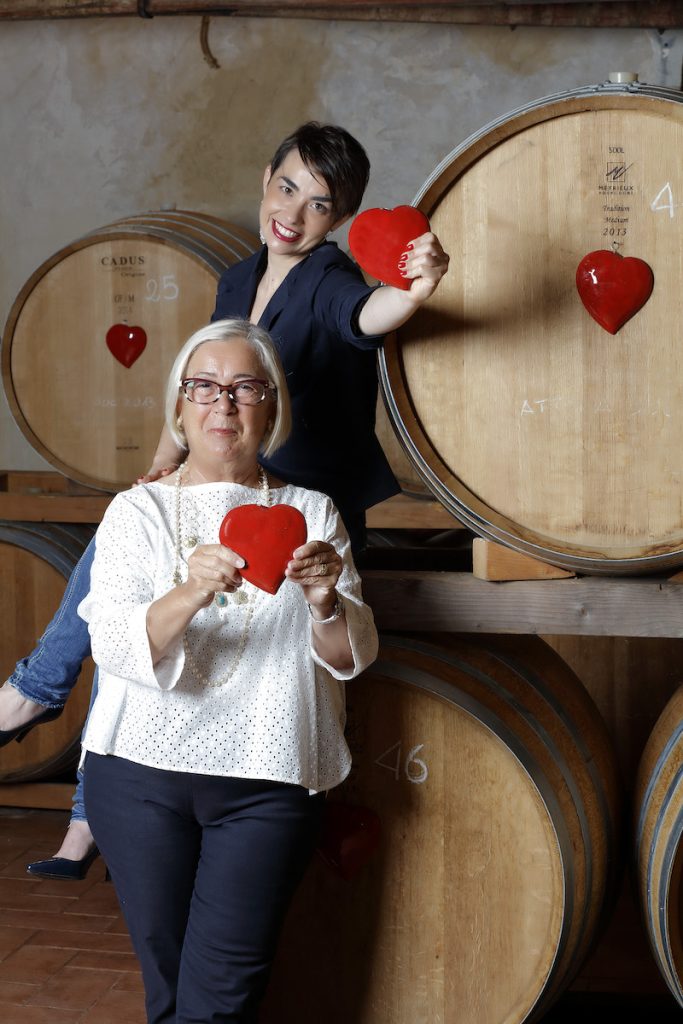
Thank you!
Thanks Donatella Cinelli Colombini and Violante Gardini Cinelli Colombini for your time and availability. You are women to learn from and the Italian wine industry has certainly had great development due to your wonderful personalities and great commitment.



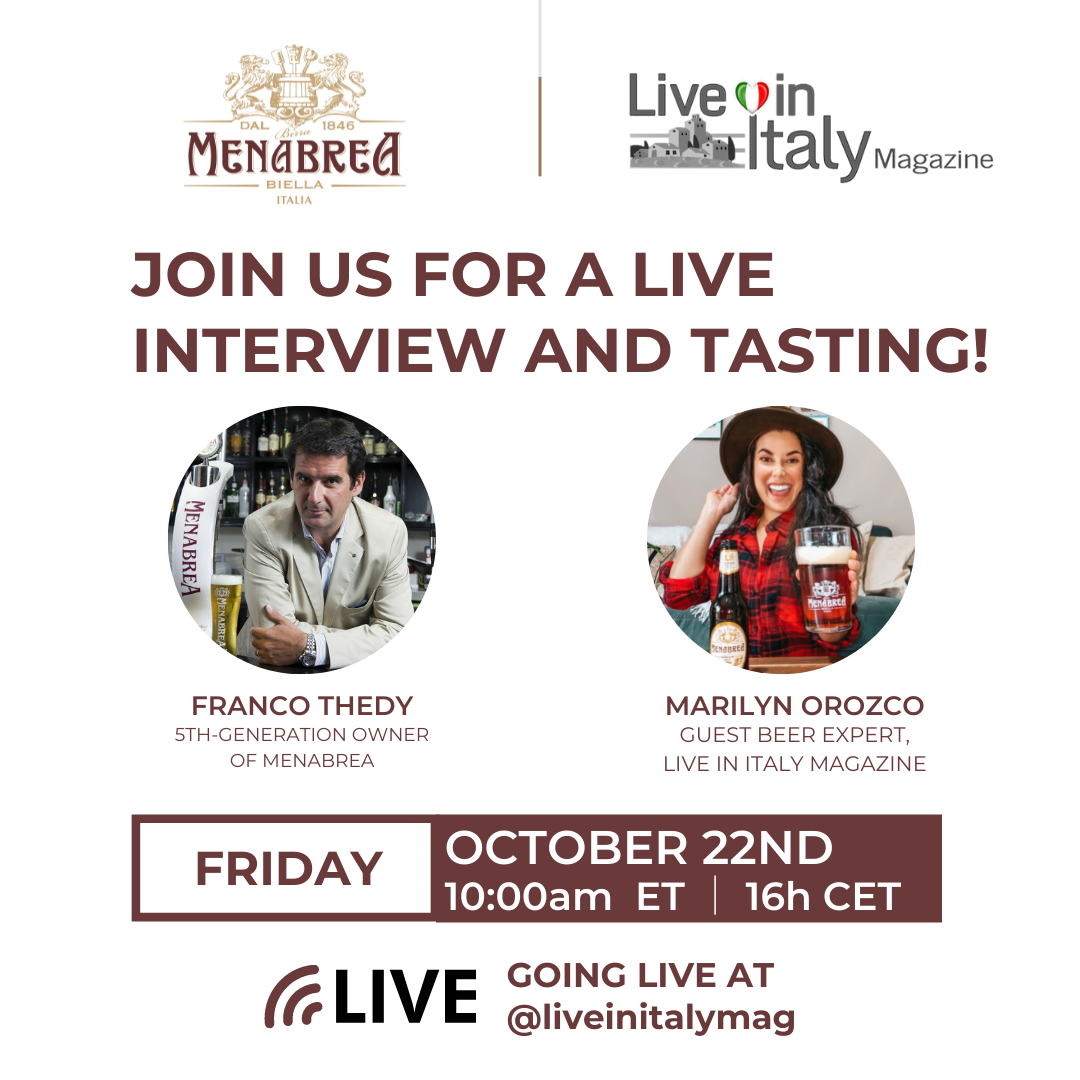
Very interesting article. Thank you! Looking forward to doing some wine tasting in Italy this fall.
Thank you Laura for reading the article. This women are truly inspiring! We hope to add an itinerary of vineyards to visit for our fall magazine. Cheers! 🇮🇹🍷